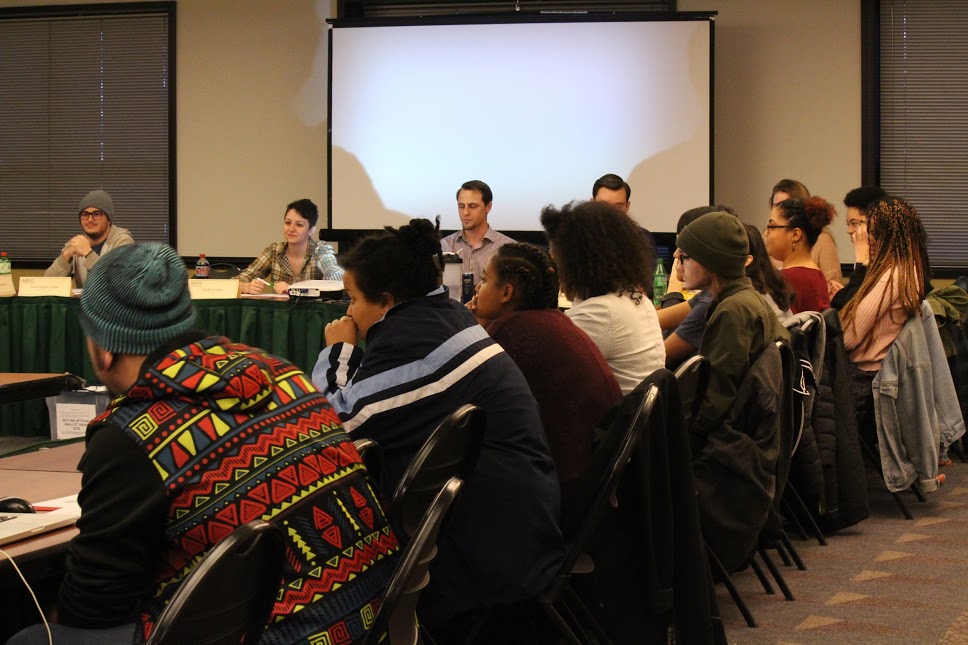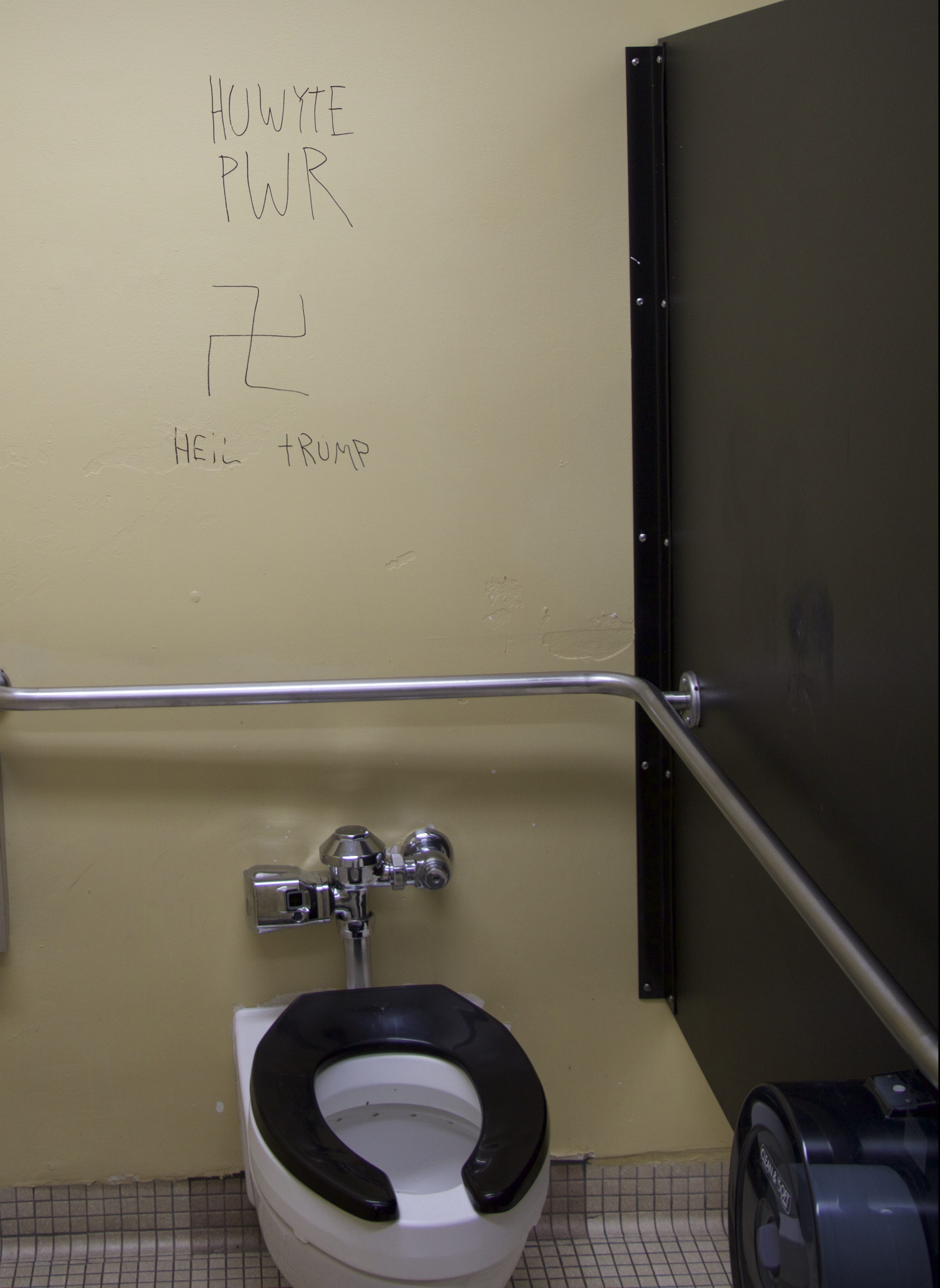The Associated Students of Portland State Senate faced a room full of students, group members and leaders expressing fear, anger or frustration with potential changes to the ASPSU constitution regarding PSU’s Organization Budget Council, a subcommittee of the Student Fee Committee that provides assistance and funding to PSU student organizations at its March 6 meeting.
The OBC helps student groups and clubs with budget development, event planning, and expenditure processing. OBC has been allotted $553,633 of student funds to be distributed to student groups in the 2018 academic year.
The proposed change would give ASPSU Senate full control of student funding and recognition processes, among other significant structural changes. These changes reflect a model implemented by Associated Students of the University of Oregon.
The constitutional changes would affect more than 100 student groups, with approximately 800 student leaders between student-operated services, Programming Boards, student organizations, and student rec clubs according to Brian Janssen, director of Student Organization Advising in Student Activities and Leadership Programs. The overall number of students within those groups is unknown at this time. Rec clubs and the Rec Clubs Council received no mention within the new constitution proposal, but most student groups are funded through OBC.
The majority of those who spoke to the Senate were made aware of the proposed changes by an email from the OBC, which outlined several concerns about how this would affect its function.
“I’m just concerned about the lack of communication from ASPSU about what would be a drastic change that would impact my club, the Neuroscience Club, and other organizations funded through the OBC,” said Thomas Madison, vice president of the Neuroscience Club.
If passed in the Senate there could be challenges in adding both the changes to the constitution and the newly created Senate seats it would require, to the same ballot. New Educational Leadership Service Award would also need to be created, which is how ASPSU members are compensated as well as many other student leaders across campus.
Public comments expressed concern about conflict of interest with Senate voting members’ involvement in student group proposals and funding. Elected Senate voting members would be added to the boards of the OBC and the Smith Memorial Student Union Advisory Board, for a total of three voting senators/board members and four non-voting board members.
ASPSU has shown itself not to be a viewpoint neutral organization with the passing of various resolutions, such as the “Resolution to Recommend Divestment from Companies Involved in Israeli Military Occupation.” This crossover of ASPSU senators and OBC board members could put specific student groups at a disadvantage.
The new constitution would also give the ASPSU president the right to veto student group proposals. That veto could be overturned by a two-thirds Senate vote.
The proposed constitution is a third option of possible constitutional changes and saw its first reading at the Senate meeting. It was the first time some Senators had heard the proposed changes. At the previous Senate meeting, two other less structurally aggressive drafts to the constitution were discussed.
Recurring concerns from public speakers were a lack of transparency from ASPSU in the lack of communication and the speed at which the process was moving, the potential for a negative impact on student groups and clubs and the notion the current OBC structure does not require revision.
At the three-plus-hour meeting’s conclusion, the senators unanimously voted to table the agenda until the next meeting on March 20, conduct at least two additional discussions about the changes and meet with groups that would be affected by the changes.
SMSU Advisory Board Chair Cassidy Hines read a letter to the Senate to start the meeting, which discussed the lack of power the SMSU Advisory Board would have under the new constitution, which would be limited to building development and maintenance.
According to Hines, the SMSU Advisory Board currently works on policies and procedures, evaluation of programs and facilities, SMSU marketing campaigns, building signage, student event marketing, space leasing and state allocations.
“This fundamental shift that ASPSU is asking for is such a drastic shift from the current model,” Hines said. “The staff and administration we work with and advise do not have the proper information or time to implement these changes you ask for. This proposed constitutional change completely ignores how [SMSU] currently operates and discussed items that do not even exist here at [PSU], and most importantly the [SMSU] is not a funding board.”
According to the SMSU Advisory Board website, the only vacant seats it holds are for an SFC appointee and an ASPSU appointee. Members of the board met prior to the meeting and voted 7–0 in opposition of this proposed constitutional change.
“By giving us no say in the proposed changes to our bylaws we perceive that these changes are a hasty takeover of the [SMSU Advisory] Board,” Hines said. “We would welcome the opportunity to work constructively with ASPSU in the future.”
Elected Senate members serving on these boards would not be required to have experience within the organizations they would serve. One reason given for the changes was to increase participation in ASPSU operations, which has seen vacant seats on a regular basis.
“This third option, the entire point of having it is we are actually trying to give more control to students and student groups, as well as increase student engagement regarding the way their money is allocated through incidental fees,” said Andy Mayer, senator and part author of the changes. “The thing we are most trying to do with this structural change is to intertwine the existence of the ASPSU with other extremely important groups on campus like the OBC and the Smith Advisory Board.”
“After hearing what you have said, I’m not convinced that you are solving anything,” said John Pinney, president of PSU Stage, a student-run theater group. “I’m convinced that you are looking for a problem that doesn’t exist. I do not understand why this Senate needs to further involve itself in OBC matters. It seems to me like a power play, the optics of it matter just as much as why you’re doing it.”
Multiple senators showed dissent at the lack of a reason for the proposal, the speed at which it was being pushed through, and whether or not a change in the constitution was a solution to low ASPSU involvement in the first place.
“I heard that part of the problem is Senate turnover; what is the cause of the problem?” said Sen. Mahamadou Sissoko. “Why aren’t we discussing the root of the problem? I’m not against moving forward but I need, and everyone here wants, more evidence.”
“I’m questioning whether the constitution is still really the best place to fix those things because typically constitutions are supposed to be very stable,” said Sen. Nicholas Hash. “They’re not supposed to change every two years like ours has been. We’ve heard from so many students and only one of them has been positive in relation to these changes. There needs to be more time and public input.”
There was discussion of slowing the constitutional changes down over the course of a year to give all students involved the time to speak on their concerns.
“I’m thinking it would be best to continue this conversation over a longer time and meet with students and student groups,” said Sen. Jemila Mohamed. “Some of my questions still weren’t answered and ELSAs weren’t even brought up, so I would suggest taking more time.”
“This has been very fast; it feels very rushed,” said Sen. Kaitlin Hoback. “But a lot of work has been put into this so far, and I want to be able to continue having this conversation with student groups, and I don’t want it to be something that gets pushed off until next year and then gets brushed under the table and never talked about again, which is my concern. So at the very least I’d like to table this till next Senate meeting.”
An email from the Senate to its public Listserv stated: “There are certainly major concerns regarding option 3, a lot of work goes into building a new governing document and it is no small undertaking…This option is not being taken lightly and we encourage as much feedback as possible.”
Changes to the constitution would need to be approved by the Senate by March 24 in order to be included in the upcoming ASPSU ballot for the April election and would require that at least 3 percent of the student body vote.
The second reading and vote on the constitutional changes will be held at the next ASPSU Senate meeting, Monday, March 20, 5–8 p.m., at a location within SMSU yet to be determined. The public is welcome to attend or speak publicly to the Senate.
Disclosure Notice: John Pinney is a current advice columnist for the Vanguard’s Arts & Culture section. Though his public comments did not pertain to his role with the Vanguard, we are disclosing this information for the sake of transparency.
Editor’s Note: This story was updated 3/13/2016 to reflect clarifications made in the print version.







I didn’t realize I made it into the Vanguard this week. Nifty. Any interested students or student leaders should note that the open constitutional work group meetings are happening on Thurs from 2:30-3:30 on the first floor of Smith in the ASPSU lounge (offices near the box office). A piece of interest that I didn’t see while skimming the article is also that several of the proposed constitutional amendment changes are based on the OSU model, which is creating much larger volumes of conflict during the discussions as well.